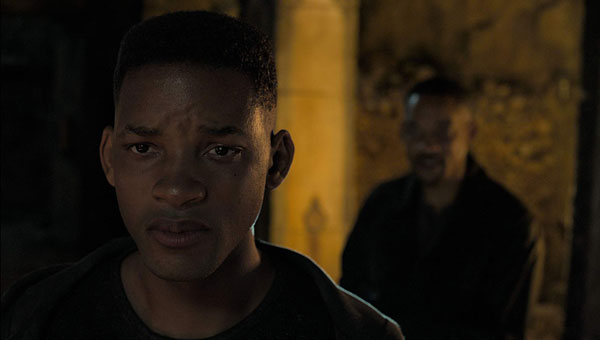Gemini Man Review

In one of this Summer’s hit films, a Hollywood agent posits the idea that studios used to cast past-their-prime TV stars as villains so that they could be defeated by up-and-coming stars, in a symbolic display of passing the baton to the next generation.
Imagine then the symbolism of Gemini Man, wherein Will Smith’s 51-year-old character is being hunted down by a clone half his age. He is deemed no longer useful by the powers-that-be, who feel it’s time for him to essentially be replaced by his younger self.
Pretty existential, huh?
Big franchises like Star Wars and Star Trek are no stranger to this concept, with recent movies featuring longer-serving actors making way for newcomers in some way or another.
Does this film therefore represent Will Smith gracefully bowing out of superstardom following a long, successful career?
Nah. It’s more likely just an excuse to showcase the latest de-aging technology.
Smith plays Henry Brogan, a hitman extraordinaire who feels he’s losing his edge and is finding it harder and harder to look in the mirror.
Did anyone say ‘foreshadowing’?
Brogan tries to quit after a recent mission, but as every film has told us since the dawn of cinema, there’s no such thing as One Last Job.
On the cusp of his retirement, Brogan learns that the people he works for may not be telling him the truth.
Enter the sinister Clay Varris (Clive Owen), head of a clandestine organisation called Gemini. For reasons which become clear, Varris is very eager to help dispatch Brogan swiftly and says he has the perfect asset for the job.
Following some obligatory exposition scenes with British actors putting on American accents (Douglas Hodge, Ralph Brown), Brogan goes on the run with the help of special agent Zakarweski (Mary-Elizabeth Winstead) and old mucker Baron (Benedict Wong).
As the trio traverses the globe searching for clues, Brogan finds himself pursued by a young Gemini hitman who looks like a younger version of himself.
So, the big question on everyone’s lips: uncanny valley or not?
Smith is a particularly challenging subject, given the length of time he has been in the public consciousness and how familiar we are with his younger face.
Now, I may have a tin eye (is that an expression?) for certain visual effects, but apart from some horrible slips later in the movie and something not quite right about the mouth, the de-aging looked better than I was expecting.
A greater achievement was the fact that it felt like Smith and his younger self were two distinct personas, which is something the film does well.
The big question for me however, was not the success of the effects, but the point of the whole exercise. There is no point in putting impressive special effects onscreen if you’re not using them to tell an engaging story.
Despite Oscar-winner Ang Lee being in the director’s chair and a script by seasoned writers including Game of Thrones’ David Benioff, the surrounding seems to have been an afterthought to the special effects, particularly in the last third of the movie.
So unengaged was I in the plot, that my mind drifted off to two things.
The first was how Doctor Evil developed his own clone, and he and mini-me danced around to the Will Smith song ‘Just the Two Of Us’, which conjured up images of Smith and his clone going on tour.
The second was how part of the story takes the gang to Cartagena, which reminded me of Romancing the Stone with Michael Douglas, which in turn reminded me of how well the de-aging of Douglas’ character worked in Ant-Man as part of telling a wider story.
It’s a pity, as this seems to be yet another recent movie in which Smith’s star wattage has been inconceivably dimmed rather than left to shine, resulting in a film with twice the Will Smith, half the charisma.
Conor Brennan